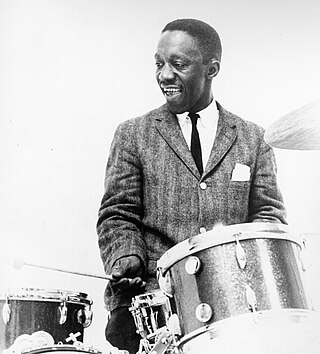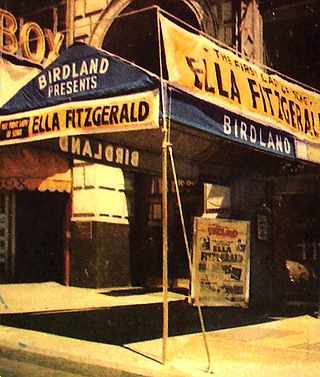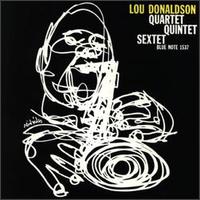
Hard bop is a subgenre of jazz that is an extension of bebop music. Journalists and record companies began using the term in the mid-1950s to describe a new current within jazz that incorporated influences from rhythm and blues, gospel music, and blues, especially in saxophone and piano playing.

Horace Ward Martin Tavares Silver was an American jazz pianist, composer, and arranger, particularly in the hard bop style that he helped pioneer in the 1950s.

Arthur Blakey was an American jazz drummer and bandleader. He was also known as Abdullah Ibn Buhaina after he converted to Islam for a short time in the late 1940s.

Clifford Benjamin Brown was an American jazz trumpeter, pianist and composer. He died at the age of 25 in a car crash, leaving behind four years' worth of recordings. His compositions "Sandu", "Joy Spring", and "Daahoud" have become jazz standards. Brown won the DownBeat magazine Critics' Poll for New Star of the Year in 1954; he was inducted into the DownBeat Hall of Fame in 1972.

William Franklin Hardman Jr. was an American jazz trumpeter and flugelhornist who chiefly played hard bop. He was married to Roseline and they had a daughter Nadege.

Curtis DuBois Fuller was an American jazz trombonist. He was a member of Art Blakey's Jazz Messengers and contributed to many classic jazz recordings.

Idrees Sulieman was an American bop and hard bop trumpeter.

A Night at Birdland, Vols. 1–3 are three separate but related 10" LPs by the Art Blakey Quintet recorded live at the Birdland jazz club on February 21, 1954, and released on Blue Note later that year, in July, October and November respectively. The quintet features horn section Clifford Brown and Lou Donaldson and rhythm section Horace Silver, Curly Russell and Blakey.

Birdland is a jazz club started in New York City on December 15, 1949. The original Birdland, which was located at 1678 Broadway, just north of West 52nd Street in Manhattan, was closed in 1965 due to increased rents, but it re-opened for one night in 1979. A revival began in 1986 with the opening of the second nightclub by the same name that is now located in Manhattan's Theater District, not far from the original nightclub's location. The current location is in the same building as the previous headquarters of The New York Observer.

A Night at Birdland, Vols. 1 & 2 are a pair of separate but related live albums by the Art Blakey Quintet. They were recorded at the Birdland jazz club on February 21, 1954 and released on Blue Note in 1956. The performance was originally spread out over three 10" LPs as A Night at Birdland Vols. 1–3 (1954).
Cleopatra Brown, known as Cleo Brown, C. Patra Brown or Cleo Patra Brown, was an American blues and jazz vocalist and pianist. She was the first woman instrumentalist to receive the NEA Jazz Masters Fellowship.

Kenneth Lyons Kersey was a Canadian jazz pianist who spent most of his life working in the United States.

The Culture of North Carolina is a subculture in the United States. As one of the original Thirteen Colonies, North Carolina culture has been greatly influenced by early settlers of English, Scotch-Irish, Scotch, German, and Swiss descent. Likewise, African Americans have had great cultural influence in North Carolina, first coming as enslaved people during colonial times. From slavery to freedom, they have helped shape things such as literary traditions, religious practices, cuisine, music, and popular culture.
Samuel Dockery, nicknamed Sure-Footed Sam, was a hard bop pianist and well-respected musician on the Philadelphia jazz scene since the early 1950s. Dockery was born in Camden, New Jersey. He appears on 11 recordings as the pianist for Art Blakey & the Jazz Messengers and composed "Sam's Tune" which appears on their 1957 Blue Note recording Ritual. In 1963 he was the pianist for Betty Carter's extended engagement at Birdland, and headed The Sam Dockery Trio in Philadelphia during the 1990s. He also taught at Philadelphia's University of the Arts. He died in a nursing home in 2015, aged 86. His brother was bassist Wayne Dockery.

Quartet/Quintet/Sextet is an album by American jazz saxophonist Lou Donaldson recorded on June 20 and November 19, 1952 and August 22, 1954 and released on Blue Note in 1957. The quartet features rhythm section Horace Silver, Gene Ramey and Art Taylor; the quintet adds trumpeter Blue Mitchell. The sextet features a new lineup, with brass section Kenny Dorham and Matthew Gee and rhythm section Elmo Hope, Percy Heath and Art Blakey.

Robbert Arris Jules Agerbeek was an Indo Dutch boogie-woogie and jazz pianist and winner of several jazz concourses in the Netherlands in the late 1950s. He was regarded as one of Europe's finest jazz pianists, covering the full spectrum of jazz styles from his early days of Boogie-woogie to Chicago traditional Jazz, swing and contemporary jazz. Agerbeek gained recognition as a highly regarded accompanist for numerous renowned American jazz musicians who toured and resided in Europe during the 1960s and 1970s. Notable collaborations included performances with Gene Ammons, Art Blakey, Don Byas, Johnny Griffin, Dexter Gordon, Hank Mobley, and Ben Webster. Agerbeek's ability to adapt to different musical styles impressed audiences and critics alike. In the 1980s, he surprised many by transitioning to traditional jazz and joining the Dutch Swing College Band.

The Jazz Messengers were a jazz combo that existed for over thirty-five years beginning in the early 1950s as a collective, and ending when long-time leader and founding drummer Art Blakey died in 1990. Blakey led or co-led the group from the outset. "Art Blakey" and "Jazz Messengers" became synonymous over the years, though Blakey did lead non-Messenger recording sessions and played as a sideman for other groups throughout his career.
"Yes sir, I'm gonna to stay with the youngsters. When these get too old, I'm gonna get some younger ones. Keeps the mind active."

Champian Fulton is an American jazz singer and pianist.

Hugh Durham Prince, also known as Hughie Prince, was an American film composer and songwriter. He composed "Boogie Woogie Bugle Boy" with lyricist Don Raye for the movie comedy, Buck Privates, which was nominated for an Academy Award for Best Song in 1942.
Pitch a Boogie Woogie is a musical comedy featurette made by Lord-Warner Pictures in North Carolina. It was produced for Black audience theaters and its performers were a mix of local talent and cast members from two traveling vaudeville shows, Winstead Mighty Minstrels, from Fayetteville, N.C., and Irvin C. Miller's Brown Skin Models, a New York-based troupe that began in Harlem in the 1920s. According to one source, the bookkeeper for Winstead's, the Brown Skin Models had become stranded and were added to the Winstead group as they played one-week stands in tobacco towns in the Carolinas. They were familiar to the filmmaker, John W. Warner, who operated a Black-audience theater, the Plaza, in a lively section of Greenville, North Carolina known as "the Block."

















